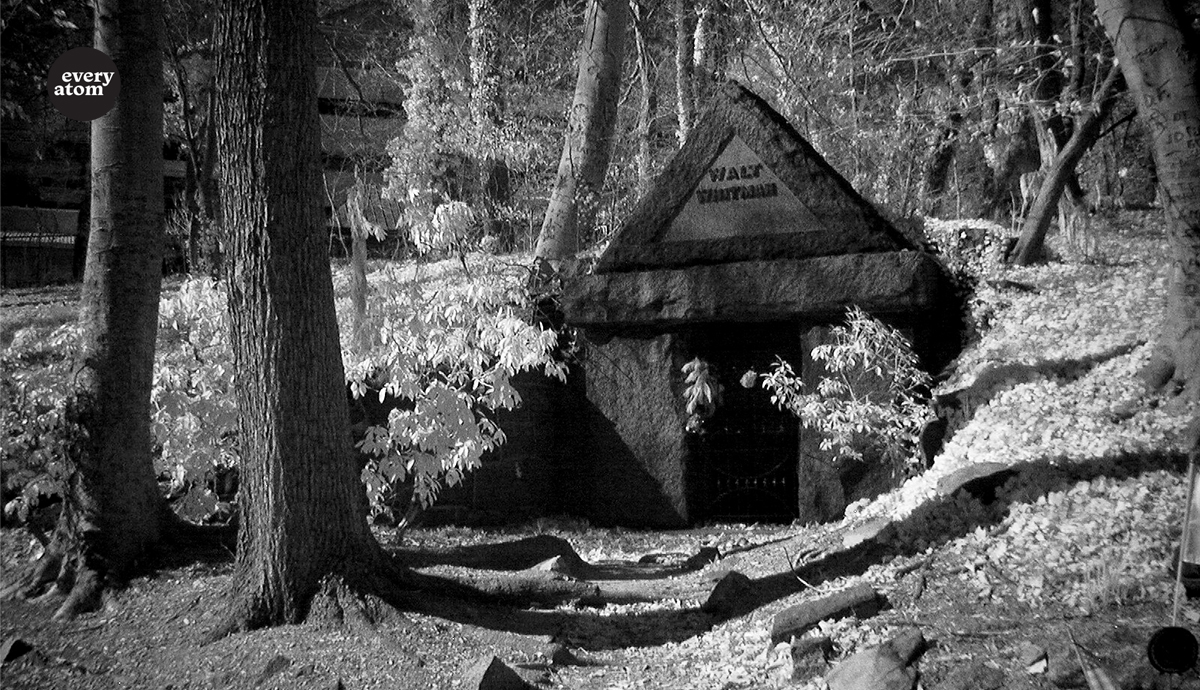Every Atom | No. 185
Introduction to Every Atom by project curator Brian Clements

And whoever walks a furlong without sympathy walks to his own funeral, dressed in his shroud.
Like the lyrics from pop songs, lines from Walt Whitman’s “Song of Myself” occasionally get stuck in my head. When I began writing a book about Whitman half a dozen years ago, these ones near the end of the poem would play over and over again:
Who has done his day’s work and will soonest be through with his supper?
Who wishes to walk with me?
Will you speak before I am gone? Will you prove already to late?
I wished to speak with Whitman. I had something to say to and about him, and I hoped I was not too late.
When I think about death, another line from the end of the poem turns and returns, repeating like a skipping record: “And as to you corpse, I think you are good manure….” The line captured Whitman’s hopeful belief that matter, including human beings, can neither be created nor destroyed. It—they—only assume new forms.
Lately, in moments of quiet and moments of crisis, this line, also from the end of the poem, has wriggled into and across my brain: “And whoever walks a furlong without sympathy walks to his own funeral, dressed in his shroud.”
I think what initially hooked me to the line is the word “furlong.” It is one of those strange Anglo-Saxon words Whitman occasionally unearths, like draggle or scud. Furlong simply means an eighth of a mile, though it has a richer history than that straightforward definition. It is a portmanteau, combining the Old English word for the trench made by a plow (furrow) and the descriptor long. A fur-long thus referred to the amount of land a yoke of oxen could plow in a day. It was a standard unit based in animal and human labor. The word survives: the broad side of an acre is still one furrow long. It is a furlong.
In his line, Whitman uses “furlong” as a general measure of distance. He could just as easily have written, “And whoever walks a mile” or “whoever walks a surveyor’s chain.” But the word does more than measure distance. It paints a picture. Here is how someone without sympathy appears, Whitman says. They look like someone trailing a plow, head down, locked into their own pursuits, oblivious to everything—and everyone—around them. And here is the furlong, the trench the person walks in as they follow their plow, the grave and the path toward the grave.
But I admit the line may finally haunt me because I do not fully understand it. Throughout “Song of Myself,” Whitman embraces death. “And to die is different from what anyone supposed,” he famously pronounces, “and luckier.” “Luckier” because, as he also writes, “the smallest sprout shows there is really no death, / And if ever there was it led forward life, and does not wait at the end to arrest it.” As with the line about the corpse making fine manure, death does not mean the end of a form but the chance to take on another one.
Yet for the person without sympathy who walks to his own funeral, death is no such thing. Instead, it is death as many of us imagine it, as loss, as separation. For those without sympathy, death is not lucky but unlucky.
How to explain the contradiction? It could be that in this line Whitman uses death figuratively. Someone without sympathy does not and cannot feel what others feel. They are an isolate, and that, for Whitman, is a kind of death—the bad kind of death. By contrast, to live, for Whitman, is not to live for oneself but, at least in part, at least sometimes, to live for others, to share your life with theirs. The best self, the true self, the alive and not dead self, sympathizes with others. Through sympathy, it contains multitudes, as Whitman boasted he did, even if those multitudes lead to contradiction, as he also admitted.
Something in me holds back when people call for a politics based on sympathy or empathy. Those emotions seem too fleeting, too biased toward those perceived to be like us; they therefore seem incapable of inspiring the sacrifices, the shared fates, required of a just society. Even so, I fear that in recent years Americans have lost some of their capacity to sympathize with others, to imagine the world from perspectives different from their own. Instead of sympathizing with those different from us, we vilify them. Perhaps it has always seemed that way, but it seems especially so today, each of us locked inside the towers of our own being, safe in our own righteousness.
If so, then Whitman may not just remind us of the need to sympathize with others, or to tell us what happens when we don’t. (A part of us dies.) He and his poem may also nudge us toward sympathy, bringing us into contact, imaginatively and emotionally, with all of the various people—the opium eater and the hounded slave, the prostitute and the president, the farmer’s girl boiling her iron tea-kettle—who populate “Song of Myself.” As Whitman also wrote, in a line that once colonized my brain for a few weeks, “Who need be afraid of the merge?”
Recommended
Nor’easter
Post-Op Appointment With My Father
Cedar Valley Youth Poet Laureate | Fall 2024 Workshop






